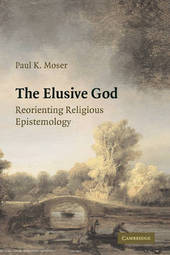
|
The Elusive God: Reorienting Religious Epistemology
Hardback
Main Details
| Title |
The Elusive God: Reorienting Religious Epistemology
|
| Authors and Contributors |
By (author) Paul K. Moser
|
| Physical Properties |
| Format:Hardback | | Pages:308 | | Dimensions(mm): Height 227,Width 162 |
|
| Category/Genre | Christian theology |
|---|
| ISBN/Barcode |
9780521889032
|
| Classifications | Dewey:212.6 |
|---|
| Audience | | Professional & Vocational | |
|---|
|
Publishing Details |
| Publisher |
Cambridge University Press
|
| Imprint |
Cambridge University Press
|
| Publication Date |
7 April 2008 |
| Publication Country |
United Kingdom
|
Description
Three questions motivate this book's account of evidence for the existence of God. First, if God's existence is hidden, why suppose He exists at all? Second, if God exists, why is He hidden, particularly if God seeks to communicate with people? Third, what are the implications of divine hiddenness for philosophy, theology, and religion's supposed knowledge of God? This book answers these questions using a new account of evidence and knowledge of divine reality that challenges scepticism about God's existence. The central thesis is that we should expect evidence of divine reality to be purposively available to humans, that is, available only in a manner suitable to divine purposes in self-revelation. This lesson generates a seismic shift in our understanding of evidence and knowledge of divine reality. The result is a much-needed reorienting of religious epistemology to accommodate the character and purposes of an authoritative, perfectly loving God.
Author Biography
Paul K. Moser is Professor and Chair of Philosophy at Loyola University Chicago. He is author of Philosophy After Objectivity (1999) and Knowledge and Evidence (Cambridge University Press, 1989). He is co-editor of The Rationality of Theism (2003) and Divine Hiddenness (Cambridge University Press, 2001). He is editor of Rationality in Action (Cambridge University Press, 1990), the Oxford Handbooks of Philosophy book series, and the journal American Philosophical Quarterly.
Reviews'I found The Elusive God to be the most profound and interesting work I have read in the past twenty years at the intersection of philosophy and theology. Instead of beginning with a demand for evidence of the existence of a divine being, the author argues that we should expect any intrusion into our lives of the sort that would convince us that God exists to be authoritative evidence that calls us not only to a cognitive viewpoint but also to a surrendering of our wills. The result of such an investigation is a re-conceptualization of the epistemological landscape relevant to the possibility of the knowledge of God.' Jonathan Kvanvig, Baylor University 'The Elusive God ... is clearly a profound and illuminating treatment on as big an issue as issues get.' Nicholas Rescher, University of Pittsburgh
|